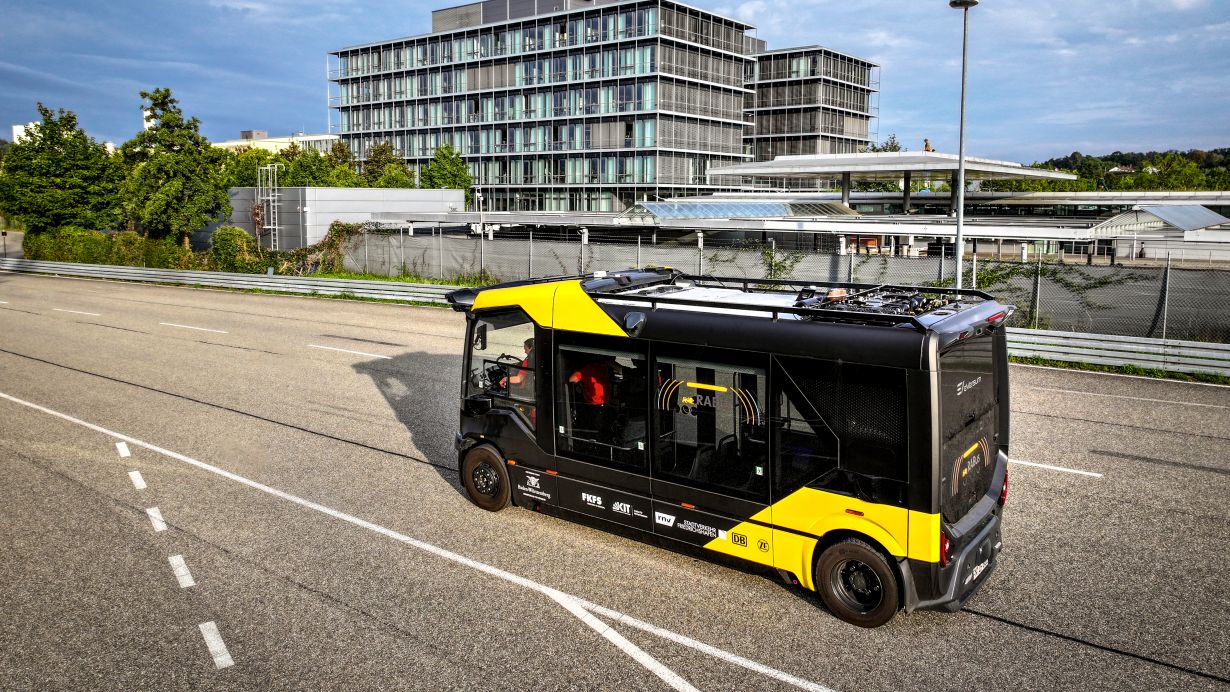Transportation experts at the Karlsruhe Institute of Technology (KIT) have demonstrated that autonomous shuttles offer great potential for public transport, enabling completely new and flexible services, especially in suburban and rural areas. In their research project RABus, self-driving minibuses were on the roads in the German cities of Mannheim and Friedrichshafen for months. The project tested their performance in road traffic, their public acceptance, and the possible effects of a large shuttle fleet on traffic.
“Users are open-minded and have a very positive attitude toward the new technology if it’s safe and it’s explained well,” said Martin Kagerbauer from KIT’s Institute for Transport Studies (IFV). In its RABus project (RABus stands for “Reality lab for Automated Bus operations for urban and rural public transport”), Kagerbauer’s team conducted comprehensive surveys showing that there is not only wide acceptance for but also great interest in using autonomous shuttles among all population groups. “We were able to show that doubts can be overcome by talking about and demonstrating the technology.”
Successful Tests under Realistic Conditions
Starting in October 2024, two autonomous shuttles operated in road traffic in each of the test regions (Mannheim and Friedrichshafen). The vehicles took more than 1,600 passengers on about 430 trips, traveling safely and reliably over 2,100 kilometers in automated mode, even in poor weather and heavy traffic. They drove at up to 50 kilometers per hour, a speed not previously reached by shuttles in comparable projects elsewhere in Germany.
Government Committed to Automated Mobility
“With the RABus project, we’ve shown that autonomous driving in public transport isn’t just a promise of the future. People can experience it now,” said Winfried Hermann, Transport Minister of Baden-Württemberg. “Our feedback shows that when people have experienced automated mobility themselves, they gain confidence in its technology. With this project, Baden-Württemberg has underscored its role as a place where innovative mobility solutions are designed and tested. This is a strong signal for the future of public transport, especially in rural areas. Our goal is to shift automated service from test mode to everyday operation, making modern mobility available to all.”
Simulations Show Potential for All of Baden-Württemberg
The researchers used simulations to find regions where everyday operation would be especially useful in the future. “We found promising areas in nearly every community in Baden-Württemberg. Having shuttles as a supplement would win new passengers by making existing local public transport much more attractive,” Kagerbauer said.
Continued Development Planned after End of Project
The vehicles will continue to be used for test purposes in Friedrichshafen even after the end of the project, ensuring that the knowledge gained during the project can be used for further improvement of autonomous driving.
About the RABus Project
The RABus project received funding from Baden-Württemberg’s transport ministry and was coordinated by the Research Institute for Automotive Engineering and Powertrain Systems Stuttgart (Forschungsinstitut für Kraftfahrwesen und Fahrzeugmotoren Stuttgart, FKFS). In addition to KIT, other participating partners included Stadtverkehr Friedrichshafen GmbH (SVF), Regionalverkehr Alb-Bodensee GmbH (RAB), Rhein-Neckar-Verkehr GmbH (rnv), and ZF Friedrichshafen AG.
More about the KIT Mobility Systems Center
Being “The University in the Helmholtz Association”, KIT creates and imparts knowledge for the society and the environment. It is the objective to make significant contributions to the global challenges in the fields of energy, mobility, and information. For this, about 10,000 employees cooperate in a broad range of disciplines in natural sciences, engineering sciences, economics, and the humanities and social sciences. KIT prepares its 22,800 students for responsible tasks in society, industry, and science by offering research-based study programs. Innovation efforts at KIT build a bridge between important scientific findings and their application for the benefit of society, economic prosperity, and the preservation of our natural basis of life. KIT is one of the German universities of excellence.

